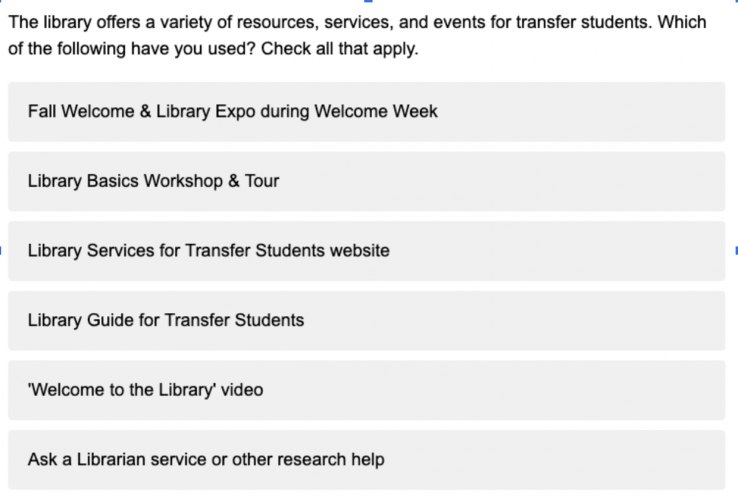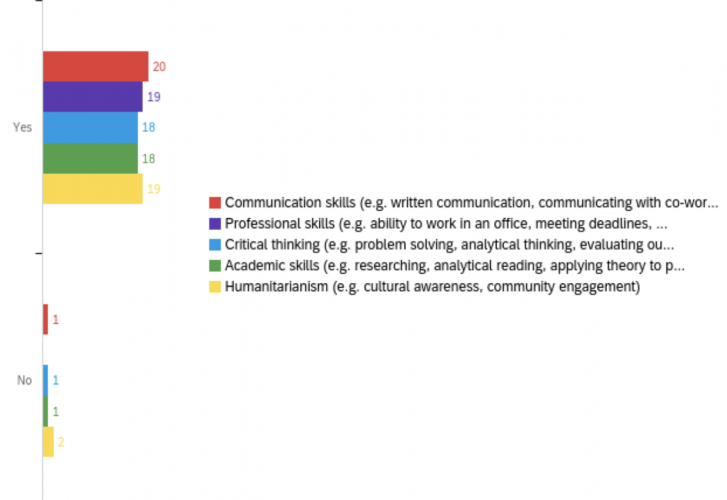From the beginning of my time as a transfer student to the University of Michigan in the Fall of 2019, I have been interested in both engaging with the transfer community and improving the overall transfer student experience. When preparing for this big transition over the summer of 2019, I was most concerned with adjusting socially and academically to a new school. However, when I actually got here, I found there were many other, more hidden aspects of campus life that I had to figure out on my own. For example: Which buildings require swipe access? Where can I scan a document? What is the “UgLi,” and is it a good place for group work?
I think we don’t often consider how all these little questions and struggles add up to create the transfer student experience. Transfer student success is often measured by quantitative academic markers; students themselves are concerned with adjusting academically and socially. I’m sure I’m not alone in saying that concerns about how to use the library as a transfer were far from the first thing on my mind. So, when looking for social science research opportunities this fall, I was intrigued by a position that entailed analyzing the specific library needs of transfer and commuter students. I saw it as an opportunity to engage with the transfer student experience through the unique, and often undervalued, lens of the library.
Ultimately, this interest led to me joining the Library Research & Evaluation team as a Research Assistant, as part of the Library Engagement Fellows Program. Through this position, I was able to utilize and strengthen my social science research skills through a project I am personally invested in and passionate about. Additionally, this position exposed me to library functioning and the specific resources offered by the University of Michigan Library.
Over the past year, my team and I have been working on two separate but connected projects aimed at assessing two programmatic areas of the library: Transfer and commuter student library needs analysis, and student engagement program evaluation, specifically Library Engagement Fellows and Library Student Mini Grants.
Each project followed a similar structure:
- a literature review and environmental scan
- survey creation, cognitive interviewing and distribution
- focus group/exit interview facilitation
- data analysis and reporting
Unfortunately, both project plans were disrupted due to the COVID-19 crisis. While circumstances did limit the attainability of the original goals, my team and I made creative adjustments which allowed us to wrap up our projects, ensure meaningful results, and leave suggestions for future project iterations.
Project One: Transfer & Commuter Students
The needs analysis of transfer and commuter students began in October 2019 with a literature review that focused on transfer student outcomes in general and with academic libraries specifically. First and foremost, we needed to establish that the library can and should contribute to enhancing the transfer student experience. As a relative newcomer to library resources, my work around the literature review also served as an introduction to the purpose and functioning of the library on a college campus.
In a learning environment that has gone digital and transitioned to more engaged styles of teaching and learning, the library must also change its functioning to remain relevant to the college campus. Moreover, transfer students do have unique needs when it comes to the library, and libraries can contribute to the transfer student experience. We also conducted environmental scans through an informational interview with the Office of New Student Programs and web searches, scoping Michigan’s library resources, Michigan’s other resources for transfer students, and library programming for transfer students at similar institutions.
Using this background information, we wrote a ten-minute online survey to assess transfer student experience with library spaces, services, and resources during their first semester. A Qualtrics survey was distributed in January 2020 to all students who transferred to Michigan in the Fall of 2019. The survey contained both quantitative and qualitative question-types. We also asked a few questions about transfer student identity, pertaining to commuter status and previous institution type.

Sample Question from the Transfer Student Library Survey
Combining the literature review with the results of the survey helped to create a transfer student focus group protocol, designed for hour-long meetings of 5-7 students, allowing them to expand upon their experiences as a transfer student in general and related to the library specifically. These were scheduled to begin in March 2020; of course, COVID-19 changes disrupted this plan. Instead, we reformatted the protocol for a virtual setting and held 2 interviews of 1-2 students over BlueJeans in April 2020; I contributed as an interviewer and a notetaker.
While we were not able to collect the amount of qualitative feedback we had originally planned for, we were able to hear some student perspectives. This sample size is very small and not generalizable to the general transfer student population, but we did hear specific suggestions and feedback that can be incorporated into future library programming, and could inspire inquiries in future project iterations. We were also able to test the viability of focus groups in a virtual format.
I am currently in the final steps of data analysis, organization, and reporting for this project. Despite the unexpected circumstances, our work throughout the year led to meaningful data and actionable enhancement suggestions, especially through our survey.
Project Two: Student Engagement Programs
The U-M Library’s student engagement program is a set of opportunities for Michigan students from all disciplines to take learning outside the classroom, supported by library resources, services, and staff. Our second project looked at two of these programs sponsored by the library: Library Student Mini Grants and Library Engagement Fellows. Informed by our successes and setbacks in our first assessment project, we began with a literature review. This effort revealed that meaningful student engagement in higher education can impact students in their academic, career, and personal success. We also did an environmental scan to learn more about similar programs at the University of Michigan and other institutions, including an informational interview with Library Learning & Teaching.
My work moving forward with this project was highly supported by what I learned through support from my supervisors on our first project. Accordingly, I felt confident taking a more independent approach to the second project. Using information gained through the literature review, I wrote online surveys for both the Mini Grant and Library Engagement programs, aiming to assess program impacts and outcomes. I utilized Qualtrics to design and distribute the surveys, which were sent to Mini Grant participants and Engagement Fellows in the 2018-2019 and 2019-2020 (current) cohorts. The Mini Grant survey was distributed in early to mid-April 2020; the Engagement Fellows survey was distributed in mid-April and is currently ongoing and will be closed in early May.

Responses to Question 7 of the Mini Grant Experience Survey: Do you believe that your experience with a Mini Grant project helped you grow in any of the following skill areas?
Our original project timeline, described the conclusion of surveying efforts aimed at participants of these two programs by April 2020. Under the altered circumstances, we planned to conduct these interviews virtually throughout May. Unfortunately, even these new solutions did not work out due to an unexpected change in our project timeline.
While we were able to distribute surveys to program participants, we were not able to follow up with focus groups to enhance our qualitative data. However, the data we were able to collect will be analyzed in the future to inform future analyses and assessments.
Learning Experience & Impacts
When I began this year at Michigan, I did not picture it ending in my childhood home and attending virtual lectures from my bed. Then again, I did not picture myself engaging so significantly with the library over the past year, and it turned out to be one of the most important learning experiences of my academic career—there is often opportunity in the unexpected. Despite the unexpected challenges we faced, I was still more than able to accomplish the two key goals I had set out to obtain in this position: gaining social science research experience and contributing in some way to the improvement of the transfer student experience at Michigan. Additionally, I had the opportunity to build significant project management skills, including risk assessment, task organization, time management, and effective communication.
Most importantly, this experience allowed me to demonstrate to myself my ability to think creatively and solve problems in unexpected circumstances, and to follow through in the face of significant challenges. My time in the Library Engagement Fellows program helped me improve both academically and professionally, and will allow me to look back on my shortened time at Michigan and know I did something to improve the experiences of future transfer students.
Acknowledgements
First and foremost, I would like to thank my supervisors Karen Reiman-Sendi and Alex Deeke for extending me this opportunity and for supporting me in these projects throughout the year. I would also like to thank Steve Griffes, Senior Manager in User Services & Operations Outreach; Amanda Peters and Doreen Bradley; Erika Johnson at the Office of New Student Programs; Craig Smith for his fantastic support in creating our surveys; Marivi Sifuentes, my fellow undergraduate research assistant during the Fall 2019 portion of this project; and the Library’s Learning & Teaching division.